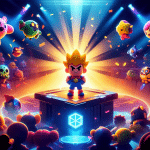Game Nights Evolved: From Card Decks to Digital Platforms navigates the journey from the tactile thrill of classic card games to the dynamic world of online gaming—where strategy, connection, and adaptability unite to keep the tradition alive.
Game Nights Evolved: From Card Decks to Digital Platforms

Game Nights Evolved: From Card Decks to Digital Platforms
Game nights have always been about connection, laughter, and a touch of competition. For generations, the shuffle of cards and the sound of chips clicking on the table set the stage for evenings spent with friends and family. Bridge, poker, and countless other card games gave people a reason to gather, share stories, and test their wits.
Today, that tradition is far from lost. Instead, it has expanded into new arenas. Online platforms now host everything from bridge tournaments to live casino tables. Even football fans can join in through แทงบอลออนไลน์, where strategy and odds take center stage in much the same way as they do at the card table. The heart of the experience remains the same: people want fun, challenge, and the thrill of making the right move at the right time.
The Classic Card Table
The deck of 52 cards has long been the anchor of game nights. Families bonded over bridge and rummy, while poker nights created legends in living rooms and smoky back rooms alike. What made these games timeless was not just the rules, but the mix of skill, chance, and the social rituals that came with them.
Bridge players, for instance, know the joy of reading subtle signals and planning several tricks ahead. Poker fans thrive on bluffing, reading opponents, and managing risk. These layers of strategy elevated card games beyond simple pastimes, making them enduring favorites that continue to bring people together.
Digital Platforms Redefining Play
As technology has advanced, game nights have gone digital. Online platforms let players compete against others from across the world, often with live chats or video features that recreate the feeling of being face to face. Online bridge platforms, for example, offer daily tournaments where players can sharpen their skills without leaving home.
Casino games, once tied to physical venues, now run around the clock online. Slots, roulette, and blackjack attract both casual players and serious strategists. Meanwhile, football betting and esports have joined the mix, broadening the definition of what a “game night” can mean. This digital shift hasn’t erased tradition—it has built on it, offering more variety and accessibility than ever before.
Why Strategy Still Matters
Despite the change in format, one element ties both classic card games and digital platforms together: strategy. Success in bridge comes from memory, planning, and careful analysis of every card played. The same mindset applies when looking at odds for a football match or deciding when to cash out during a poker game online.
Strategy gives players a sense of control, even when chance plays a role. It keeps the experience engaging, ensuring that the thrill comes not just from luck, but from thoughtful choices. That balance of skill and unpredictability explains why people continue to love both card games and modern online options.
Social Connection in New Spaces
One of the biggest shifts in game nights is how people connect. Where once everyone needed to sit around the same table, now digital platforms allow communities to form across time zones and continents. A player in Canada can join a bridge match with a partner in Europe. Football fans in different cities can place wagers while discussing the game in real time.
These online spaces are not replacing in-person game nights but complementing them. Families still gather around the kitchen table, but they also log in for a few hands online during the week. The social element remains, just in a new format, proving that human connection is at the core of every gaming tradition.
The Appeal of Variety
Game nights today offer something for every taste. Some players stick to the classics, while others mix in online casino games, esports, or sports betting. Having more options means that everyone can find a game that matches their mood, whether it’s a slow, strategic bridge session or the fast pace of live sports.
For many, the variety also keeps the tradition fresh. A poker night can start with a few rounds online, shift to a live-streamed football game, and end with casual card play around the table. Game nights have become flexible, adapting to the preferences and schedules of modern players.
Balancing Old and New
While digital platforms dominate the conversation today, the appeal of the physical card deck should not be underestimated. The tactile feel of cards, the subtle signals between partners, and the rhythm of in-person play remain unmatched. That said, digital tools have opened doors, giving players a way to stay connected and engaged even when they cannot gather in the same room.
The future of game nights likely lies in balance. People will continue to cherish the old rituals while embracing new technologies that expand what’s possible. It’s less about replacing traditions and more about evolving them.

A Tradition That Endures
From card decks to smartphones, the essence of game nights hasn’t changed. It’s about more than winning—it’s about the shared moments, the excitement of strategy, and the joy of play. Whether players gather around a bridge table, join a virtual casino, or track odds in real time, the spirit of gaming endures.
The tools and platforms may evolve, but the reasons we play remain the same. Game nights are alive and well, thriving in both their classic and modern forms, and will likely continue to adapt for generations to come.








